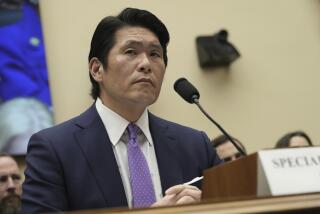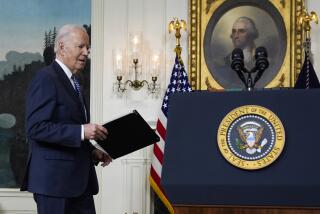2005 a Better Year for Right to Know
WASHINGTON — Federal agencies made somewhat fewer decisions to classify top secret and confidential information last year than the year before, and declassified slightly more documents, according to a new government report Friday.
But for the third year in a row, Vice President Dick Cheney refused to report his office’s activities in either the classification or declassification of documents.
Despite an executive order signed by President Bush in 2003 requiring all agencies or “any other entity within the executive branch that comes into the possession of classified information” to report on its activities, the vice president’s office maintains that it has no legal obligation to report on its classification decisions.
The vice president says that his office is not an agency, and that the vice president is unique in having both an executive and a legislative role: He is president of the Senate.
Monitors of government secrecy say the vice president is flouting his own president’s authority in this matter.
“It undermines oversight of the classification system and reveals a disdain for presidential authority,” said Steven Aftergood, director of the Project on Government Secrecy at the Federation of American Scientists. “It’s part of a larger picture of disrespect that this vice president has shown for the norms of oversight and accountability.”
A spokeswoman for Cheney reiterated the vice president’s stance on the issue.
“These reporting requirements are not applicable to [the office of the vice president],” spokeswoman Lea Anne McBride said Friday. “This has been thoroughly reviewed and it’s been determined that the reporting requirement does not apply to [the office], which has both legislative and executive functions.”
The vice president’s office last reported in 2002.
Since the beginning of Bush’s presidency, agencies and other entities each year had reported increasing numbers of decisions to classify information as top secret, secret or confidential. These numbers rose from 8.65 million classification decisions reported in 2001 to a record 15.65 million in 2004.
Last year, agencies made 14.2 million decisions, a 9% decrease from 2004 and slightly less than what had been reported in 2003, according to a new report of the National Archives Information Security Oversight Office.
Agencies also declassified 29.5 million pages of documents in 2005, the report shows. This marked a 4% increase from the 28 million pages of documents declassified the year before.
This represents a turnaround from the annual scaling back of documents declassified under Bush, with 100 million pages declassified in 2001 and 44 million declassified in 2002.
The National Archives office that monitors these decisions calls last year’s increases in declassification and decreases in classification “a positive step.”
More to Read
Sign up for Essential California
The most important California stories and recommendations in your inbox every morning.
You may occasionally receive promotional content from the Los Angeles Times.










